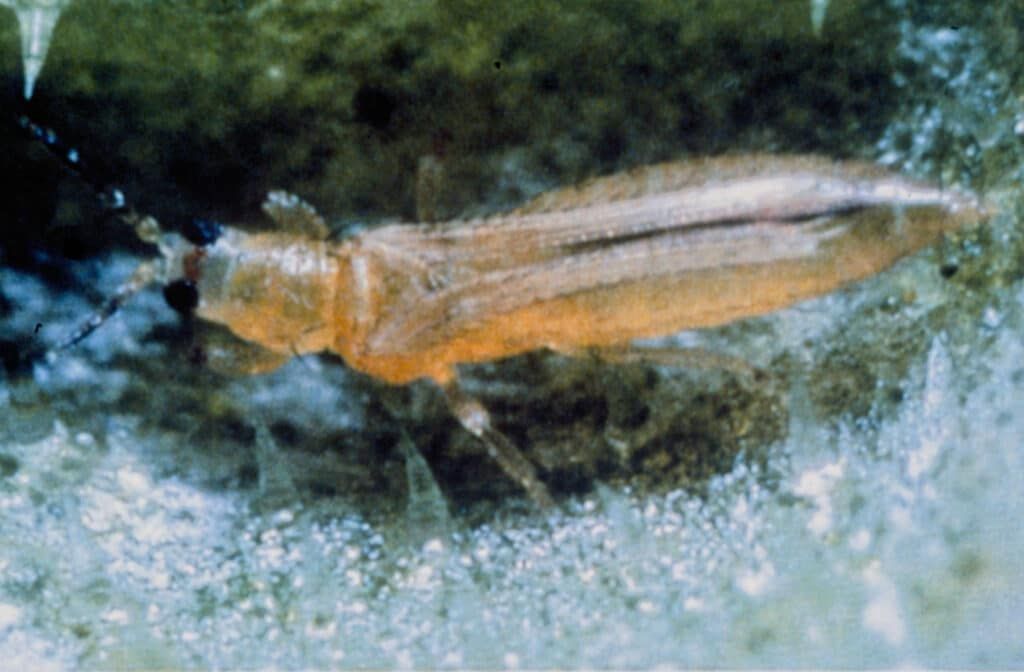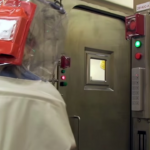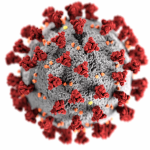Russia finds another stage for the Ukraine “biolabs” disinformation show
By Filippa Lentzos, Jez Littlewood | July 8, 2022
 The agricultural pest Thrips palmi can wreak havoc on crops. Cuba once accused the United States of unleashing an infestation on the island, bringing the matter to a meeting of the Biological Weapons Convention. Credit: Florida Division of Plant Industry Archive/Florida Department of Agriculture and Consumer Services/Bugwood.org. CC BY 3.0.
The agricultural pest Thrips palmi can wreak havoc on crops. Cuba once accused the United States of unleashing an infestation on the island, bringing the matter to a meeting of the Biological Weapons Convention. Credit: Florida Division of Plant Industry Archive/Florida Department of Agriculture and Consumer Services/Bugwood.org. CC BY 3.0.
For the first time since the Cuban government accused the United States of spraying its country with a crop-eating bug called Thrips palmi in 1997, a Biological Weapons Convention member is invoking a special procedure to investigate alleged violations of the treaty. Once again, a country is accusing the US of nefarious activity. But this time it is Russia—building on its years-long campaign involving largely debunked claims about a US bioweapons program in Ukraine and other former Soviet republics—that is calling for the rarely used diplomatic procedure.
The move to trigger Article V of the bioweapons treaty represents a significant escalation of Russia’s efforts to promote claims of illegal US “biolabs” ringing its borders. Now the treaty’s 184 member states will have to hold a special session this summer to hear the Russian allegations and the US response.
At the meeting, Russia will face substantial hurdles in convincing the world that its claims are true. Russia has already brought its assertions to the most prominent venue of international diplomacy, the United Nations Security Council. So far this year, the Council has met three times on supposed US bioweapons in formal and informal sessions. The UN, independent media, and outside experts have concluded that the Russian documentation of its claims provides no indication that US-funded research and assistance to Ukrainian public and animal health labs support anything other than peaceful activities. And Ukraine, unlike Russia, makes annual reports to the Biological Weapons Convention on its activities, known as confidence building measures, publicly available.
Nonetheless, the coming meeting of bioweapons treaty members will have important implications for a major upcoming review of the treaty, discussions about strengthening the agreement, and prospects for increasing peaceful international cooperation on biological issues. The meeting is an indicator of just how the scope of Russia’s biological weapons disinformation has grown since it invaded Ukraine.
Article V, again. Cuba made numerous allegations about the United States attacking it with bioweapons during the Cold War, but pursued only one in a formal diplomatic meeting. On October 21, 1996, a single-engine plane operated by the US State Department involved in anti-narcotics operations was flying over Cuba after regular maintenance in the United States. Cuba had allowed such flights in the past, but this time, the Cubans alleged, a civilian pilot flying below the US plane noticed something suspicious: The US plane had emitted some kind of smoke. While Washington said the plane was simply signaling to the civilian aircraft for safety reasons, Cuba concluded that what really happened was that the United States had released a plume of Thrips palmi insects over the country’s agricultural fields. Several weeks later, the Cubans said, the insects were ravaging crops on the island in an infestation.
The experience of Cuba invoking Article V in the summer of 1997 proved underwhelming. Only 74 members of the treaty attended the meeting. They elected a committee (referred to as a “bureau”) that included the United Kingdom as chair and Brazil, Canada, Iran, the Netherlands, Nigeria and Russia as vice-chairs. The committee was to consult on the provided information and, as far as possible, clarify and resolve Cuba’s concerns. The committee was to report back to the convention’s member states by the end of 1997. As the researcher Jonathan Tucker recounted in a 2011 analysis, eight treaty members, including allies of the United States like Canada, said they did not see a link between the US flight over Cuba and the country’s subsequent infestation. Two of Cuba’s fellow communist countries, China and Vietnam, “found it impossible to make a determination.” According to Tucker, only North Korea supported the Cuban position.
In its December 1997 report, which was not made public, the committee said that the technical complexity of Cuba’s allegation, the time between the alleged incident and Cuba’s request for an Article V meeting (known as a formal consultative meeting), and the lack of detailed information related to the matter, made it impossible to draw any consensus conclusions. The Article V process, however, worked as intended; it had provided a forum to bring a compliance issue to the attention of other treaty members. Moreover, in the view of the committee, the experience was further evidence that treaty members needed to agree to an effective means of strengthening the ability to assess compliance, something that has yet to happen.
High profile disinformation. As the war in Ukraine morphed from risk to reality earlier this year, Russia’s biological weapons disinformation campaign intensified and adopted a much higher political profile than it has had in recent years. These days, instead of relatively obscure figures like the head of Russia’s special forces for nuclear, biological and chemical protection or the chair of the parliament’s defense committee making the accusations, President Vladimir Putin himself is levelling them.
Moscow actively laid the groundwork for taking its disinformation campaign to new heights before invading Ukraine by pre-positioning its false narrative—making statements to the media, amplifying select tweets, and hacking journalists’ accounts. On the diplomatic side, over the past few months, Russia has provided documentation to the Security Council and circulated Notes Verbales (diplomatic memos) to national missions to the UN in both New York and Geneva, supposedly providing evidence to back up its allegations of biological weapons activities in Ukraine.
Oddly, the consultation procedures under Article V of the bioweapons treaty are generally viewed as a way to discuss issues at a lower level before escalating to the Security Council. Russia has reversed this logic and is invoking Article V after failing to gain any substantive support in the Security Council or in the UN General Assembly for its allegations. Calling a bioweapons treaty meeting appears to be simply another airing of its allegations.
Why does Russia’s move matter? Few experts take Russia’s claims seriously, but they are potentially more damaging to the bioweapons treaty than Cuba’s in 1997 for five reasons.
First, they will re-energize false portrayals of biological labs from earlier this year, undermine biosafety and biosecurity efforts, further erode confidence in critical public and animal health infrastructure, and distract attention away from Russia’s own actions in Ukraine which include attacks on healthcare facilities.
Second, many countries have called for development aid along the lines of what US assistance, through its Biological Threat Reduction Program, has provided to dozens of Ukrainian labs on public and animal health research and disease surveillance. Many countries want assistance and support to conduct this work, and, in fact, the World Health Organization requires its members (every country in the world save one) to monitor diseases within their borders. If Russia is effective at defining US development assistance as a form of non-compliance with the bioweapons treaty, the upcoming Article V process could seriously undermine peaceful cooperation under the treaty.
Third, Russia has amplifiers, like China. Some countries might actually believe the Russian allegations, but others will view them as an opportunity to put the United States on the back foot and use the Article V meeting as another venue to challenge the US-led global order.
Fourth, the Article V process is broad. The 1997 meeting did not set the only pattern of potential outcomes. As Tucker observed, Cuba seemed satisfied simply to air its allegations in a formal meeting. Russia may not be so easily satisfied and may press for some form of follow-up consultations or clarification process, or even call for an inspection or investigation. That would drag out the process and could undermine overall confidence in the treaty’s ability to address allegations of non-compliance. It would also be ironic because during negotiations in the 1990s, China, Russia and others maintained their insistence that consultation procedures must be voluntary and “frivolous requests” for investigations must be prevented.
Finally, every five years the members of the bioweapons treaty meet to discuss and review it. That’s set to happen this coming November. It is well-known that the treaty has no agreed verification mechanism and while this year’s review conference is unlikely to restart formal negotiations on one, the indicators were pointing towards a more formal discussion of compliance assurance mechanisms. The Article V deliberations could stall progress on that front if relations between treaty members sour as a result of Russia’s move.
Russia could sway countries to its position at the upcoming Article V meeting about alleged US bioweapons programs. That’s already happened several times during the Ukraine conflict. A greater danger, however, comes from countries who are unconvinced by the submitted evidence and information but who remain silent and effectively abstain from being caught in a confrontation between the United States and Russia.
China, India, and the United Arab Emirates abstained in a Security Council resolution vote on Feb. 25 that called for an end to the Ukraine invasion. In early March, a General Assembly vote that was characterized as a global expression of outrage that deplored Russia’s invasion of Ukraine, was actually much less. Although 141 of the 193 UN member states voted for the resolution, 35 abstained, including India, China, Iran, Cuba, and Pakistan, while alongside Russia, four others voted against it (Belarus, North Korea, Eritrea, and Syria). In a similar manner, the General Assembly resolution to remove Russia from the Human Rights Council had a far from comforting result. Ninety-three countries voted in favor, 24 voted against, and 58 abstained. Russia, China, Cuba, North Korea, Iran, Syria, and Vietnam were among those who voted against while some countries who are important players in the future of the bioweapons treaty such as India, Brazil, South Africa, Mexico, Pakistan, Singapore, Malaysia, and Indonesia abstained.
Russia’s decision to trigger a special session of the Biological Weapons Convention now runs the risk of co-opting the treaty, and using it as a platform to spread and legitimize disinformation—particularly if important countries stay silent when these allegations are aired. It will take hard work and ingenuity from disarmament diplomats to ensure the meeting does not descend into acrimony and that any report from it is accepted as an accurate record of the deliberations. Beyond the meeting, however, there is an urgent need to counter Moscow’s destructive narrative and to protect the norm and institutions that prohibit biological weapons from spurious and unsubstantiated allegations that could polarize the bioweapons treaty even more than it already is.
Together, we make the world safer.
The Bulletin elevates expert voices above the noise. But as an independent nonprofit organization, our operations depend on the support of readers like you. Help us continue to deliver quality journalism that holds leaders accountable. Your support of our work at any level is important. In return, we promise our coverage will be understandable, influential, vigilant, solution-oriented, and fair-minded. Together we can make a difference.
Keywords: Biological Weapons Convention, Russia, Ukraine, biolabs
Topics: Biosecurity
















Perhaps the patent absurdity of operating facilities in 2022 which originated under the Nunn-Lugar Cooperative Threat Reduction program 31 years earlier might have something to do with Russian skepticism…but then, the USDoD is very good at life extension, isn’t it?
Thank you for keeping me well-informed.
When Under-Secretary of State Victoria Nuland testified under oath before the Senate Foreign Relations Committee that biological laboratories had been operating in Ukraine under US direction, I had no idea she was spreading “Russian disinformation”
As a former DoD biomedical institute director/commander (an institute that no longer exists but then among those that remain), I have no serious suspicions of untoward behavior at any of the many remote labs operated by USDoD, mostly US Army.
However, in articles like this, it makes sense to recognize that DoD has “permanent” remote biomedical labs worldwide, including in Tbilisi, Georgia — once part of the USSR.
Also that DoD often has smaller biomedical units locating in other places, including nations on the perimeters of Russia and China — such as Ukraine.